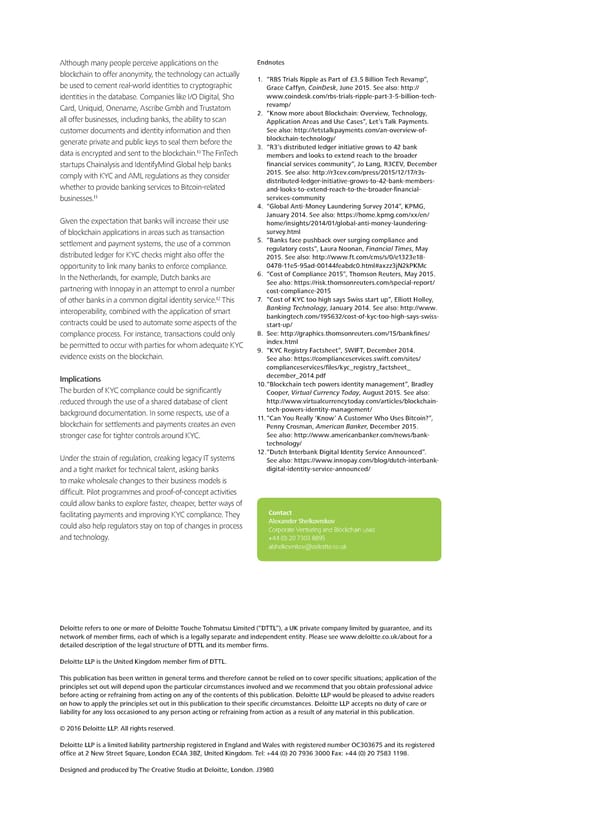Although many people perceive applications on the Endnotes blockchain to offer anonymity, the technology can actually 1. “ RBS Trials Ripple as Part of £3.5 Billion Tech Revamp”, be used to cement real-world identities to cryptographic Grace Caffyn, CoinDesk, June 2015. See also: http:// identities in the database. Companies like I/O Digital, Sho www.coindesk.com/rbs-trials-ripple-part-3-5-billion-tech- Card, Uniquid, Onename, Ascribe Gmbh and Trustatom revamp/ all offer businesses, including banks, the ability to scan 2. “ Know more about Blockchain: Overview, Technology, Application Areas and Use Cases”, Let’s Talk Payments. customer documents and identity information and then See also: http://letstalkpayments.com/an-overview-of- generate private and public keys to seal them before the blockchain-technology/ 3. “ R3’s distributed ledger initiative grows to 42 bank 10 data is encrypted and sent to the blockchain. The FinTech members and looks to extend reach to the broader startups Chainalysis and IdentifyMind Global help banks financial services community”, Jo Lang, R3CEV, December comply with KYC and AML regulations as they consider 2015. See also: http://r3cev.com/press/2015/12/17/r3s- whether to provide banking services to Bitcoin-related distributed-ledger-initiative-grows-to-42-bank-members- and-looks-to-extend-reach-to-the-broader-financial- 11 services-community businesses. 4. “ Global Anti-Money Laundering Survey 2014”, KPMG, Given the expectation that banks will increase their use January 2014. See also: https://home.kpmg.com/xx/en/ home/insights/2014/01/global-anti-money-laundering- of blockchain applications in areas such as transaction survey.html settlement and payment systems, the use of a common 5. “Banks face pushback over surging compliance and distributed ledger for KYC checks might also offer the regulatory costs”, Laura Noonan, Financial Times, May 2015. See also: http://www.ft.com/cms/s/0/e1323e18- opportunity to link many banks to enforce compliance. 0478-11e5-95ad-00144feabdc0.html#axzz3jN2kPKMc In the Netherlands, for example, Dutch banks are 6. “ Cost of Compliance 2015”, Thomson Reuters, May 2015. partnering with Innopay in an attempt to enrol a number See also: https://risk.thomsonreuters.com/special-report/ cost-compliance-2015 12 7. “ Cost of KYC too high says Swiss start up”, Elliott Holley, of other banks in a common digital identity service. This interoperability, combined with the application of smart Banking Technology, January 2014. See also: http://www. contracts could be used to automate some aspects of the bankingtech.com/195632/cost-of-kyc-too-high-says-swiss- start-up/ compliance process. For instance, transactions could only 8. See: http://graphics.thomsonreuters.com/15/bankfines/ be permitted to occur with parties for whom adequate KYC index.html evidence exists on the blockchain. 9. “ KYC Registry Factsheet”, SWIFT, December 2014. See also: https://complianceservices.swift.com/sites/ complianceservices/files/kyc_registry_factsheet_ Implications december_2014.pdf The burden of KYC compliance could be significantly 10. “ Blockchain tech powers identity management”, Bradley Cooper, Virtual Currency Today, August 2015. See also: reduced through the use of a shared database of client http://www.virtualcurrencytoday.com/articles/blockchain- background documentation. In some respects, use of a tech-powers-identity-management/ blockchain for settlements and payments creates an even 11. “ Can You Really ‘Know’ A Customer Who Uses Bitcoin?”, Penny Crosman, American Banker, December 2015. stronger case for tighter controls around KYC. See also: http://www.americanbanker.com/news/bank- technology/ Under the strain of regulation, creaking legacy IT systems 12. “ Dutch Interbank Digital Identity Service Announced”. See also: https://www.innopay.com/blog/dutch-interbank- and a tight market for technical talent, asking banks digital-identity-service-announced/ to make wholesale changes to their business models is difficult. Pilot programmes and proof-of-concept activities could allow banks to explore faster, cheaper, better ways of facilitating payments and improving KYC compliance. They Contact could also help regulators stay on top of changes in process Alexander Shelkovnikov Corporate Venturing and Blockchain Lead and technology. +44 (0) 20 7303 8895 alshelkovnikov@deloitte.co.uk Deloitte refers to one or more of Deloitte Touche Tohmatsu Limited (“DTTL”), a UK private company limited by guarantee, and its network of member firms, each of which is a legally separate and independent entity. Please see www.deloitte.co.uk/about for a detailed description of the legal structure of DTTL and its member firms. Deloitte LLP is the United Kingdom member firm of DTTL. This publication has been written in general terms and therefore cannot be relied on to cover specific situations; application of the principles set out will depend upon the particular circumstances involved and we recommend that you obtain professional advice before acting or refraining from acting on any of the contents of this publication. Deloitte LLP would be pleased to advise readers on how to apply the principles set out in this publication to their specific circumstances. Deloitte LLP accepts no duty of care or liability for any loss occasioned to any person acting or refraining from action as a result of any material in this publication. © 2016 Deloitte LLP. All rights reserved. Deloitte LLP is a limited liability partnership registered in England and Wales with registered number OC303675 and its registered office at 2 New Street Square, London EC4A 3BZ, United Kingdom. Tel: +44 (0) 20 7936 3000 Fax: +44 (0) 20 7583 1198. Designed and produced by The Creative Studio at Deloitte, London. J3980 J3975_BlockchainInsert.indd 2 15/01/2016 17:00
 Blockchains: Enigma. Paradox. Opportunity. Page 20 Page 22
Blockchains: Enigma. Paradox. Opportunity. Page 20 Page 22